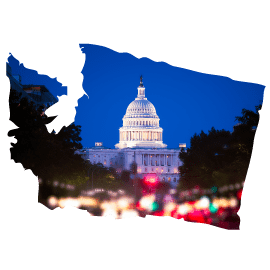Middle School Licensure Deficiencies:
Washington
Secondary Teacher Preparation Policy
Analysis of Washington's policies
Unfortunately, Washington allows middle school teachers to teach on a generalist K-8 license. Those teaching on this generalist license need only pass the content test required of elementary teachers. Therefore, there is no assurance that these middle school teachers will have sufficient knowledge in each subject they teach.
Washington offers, but does not require, middle school licenses (grades 4-9).
Recommendations for Washington
Prepare middle school teachers to teach middle school.
Washington should not allow middle school teachers to teach on a generalist license that does not differentiate between the preparation of middle school teachers and that of elementary teachers. These teachers are less likely to be adequately prepared to teach core academic areas at the middle school level because their preparation requirements are not specific to the middle or secondary levels, and they need not pass a subject-matter test in each subject they teach. Washington should ensure that students in grades 7 and 8 have teachers who are appropriately prepared to teach grade-level content.
Require content testing in all core areas.
Washington should require subject-matter testing for all middle school teacher candidates in every core academic area they intend to teach as a condition of initial licensure. The state should set its passing scores to reflect high levels of performance to ensure meaningful middle school content tests.
State response to our analysis
Washington recognized the factual accuracy of this analysis.
Updated: December 2017
Select another topic
General Teacher Preparation
- Program Entry
- Teacher Shortages and Surpluses
- Program Performance Measures
- Program Reporting Requirements
- Student Teaching/Clinical Practice
- Teaching Methods
Elementary Teacher Preparation
Secondary Teacher Preparation
- Middle School Content Knowledge
- Middle School Licensure Deficiencies
- Adolescent Literacy
- Secondary Content Knowledge
- Secondary Licensure Deficiencies
Special Education Teacher Preparation
Alternate Routes
Hiring
- Requirements for Out-of-State Teachers
- Provisional and Emergency Licensure
- Licensure for Substitute Teachers
- Supporting New Teachers
Teacher and Principal Evaluation
Teacher Compensation
Retaining Effective Teachers
Early Childhood Preparation
How we graded
3B: Middle School Licensure Deficiencies
- Specific Licensure: The state should not permit middle school teachers to teach on a generalist license that does not differentiate between the preparation of middle school teachers and the preparation of elementary teachers.
The total goal score is earned based on the following:
- Full credit: The state will earn full credit if it requires teachers to teach on a middle school license (No K-8).
- 1/2 credit: The state will earn one half credit for either maintaining specific requirements limiting elementary teachers ability to teach in departmentalized middle schools or requiring teachers holding a K-8 license to demonstrate some relevant content knowledge at the middle school level.
- 0/0 credit: The state will not earn any credit if it offers a K-8 license or a K-8 license in addition to a middle school license, allowing elementary teachers to teach single subjects at the middle school level without passing single-subject tests, or if the state offers a K-8 license and teachers can teach grades 7 and 8 in a self-contained classroom.
Research rationale
Middle school grades are critical years of schooling. It is in these years that far too many students fall through the cracks. However, requirements for the preparation and licensure of middle school teachers can be especially problematic. States need to distinguish the knowledge and skills needed by middle school teachers from those needed by an elementary teacher. Whether teaching a single subject in a departmentalized setting or teaching multiple subjects in a self-contained setting, middle school teachers must be able to teach significantly more advanced content than elementary teachers. In order to do so, middle school teachers must be deeply knowledgeable about every subject they will be licensed to teach, and able to pass a licensing test in every core subject to demonstrate this knowledge.[1] The notion that someone should be identically prepared to teach first grade or eighth grade mathematics seems ridiculous, but states that license teachers on a K-8 generalist certificate essentially endorse this idea.
[1] For additional research on the importance of subject matter knowledge, see: Dee, T. S., & Cohodes, S. R. (2008). Out-of-field teachers and student achievement: Evidence from matched-pairs comparisons. Public Finance Review, 36(1), 7-32.; Chaney, B. (1995). Student outcomes and the professional preparation of eighth-grade teachers in science and mathematics. NSF/NELS: 88 Teacher Transcript Analysis. Retrieved from http://eric.ed.gov/?id=ED389530; Weglinsky, H. (2000). How teaching matters: Bringing the classroom back into discussions of teacher quality (Policy Information Center report). Princeton, NJ: Educational Testing Service. Retrieved from http://www.ets.org/Media/Research/pdf/PICTEAMAT.pdf ; A report published by the National Mathematics Advisory Panel (NMAP) concludes that a teacher's knowledge of math makes a difference in student achievement. National Mathematics Advisory Panel. (2008). Foundations for success: The final report of the National Mathematics Advisory Panel. US Department of Education. Retrieved from http://www2.ed.gov/about/bdscomm/list/mathpanel/report/final-report.pdf.

